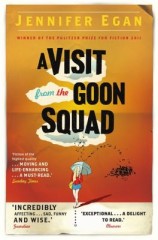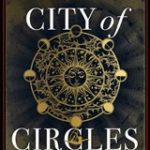A Visit From the Goon Squad
Jennifer Egan, Corsair ($25)
Check out this great review from The Guardian as reviewed by Sarah Churchwell:
The title of Jennifer Egan’s new novel may make it sound more like an episode of Scooby-Doo than an exceptional rendering of contemporary America, but don’t be fooled. The book received rave reviews when it was published in the US last year, and for good reason; it has since been named a finalist for several prestigious American prizes. Egan has said that the novel was inspired by two sources: Proust’s la Recherche du Temps Perdu, and HBO’s The Sopranos. That shouldn’t make sense but it does: Goon Squad is a book about memory and kinship, time and narrative, continuity and disconnection, in which relationships shift and recombine kaleidoscopically. It is neither a novel nor a collection of short stories, but something in between: a series of chapters featuring interlocking characters at different points in their lives, whose individual voices combine to a create a symphonic work that uses its interconnected form to explore ideas about human interconnectedness. This is a difficult book to summarise, but a delight to read, gradually distilling a medley out of its polyphonic, sometimes deliberately cacophonous voices.
The “goon squad” of the title is not itself a reference to The Sopranos: there are no mobsters here. It is one character’s name for time: “Time’s a goon, right? You gonna let that goon push you around?” Everyone in the book is pushed around by time, circumstance and, occasionally, the ones they love, as Egan reveals with great elegance and economy the wobbly arcs of her characters’ lives, their painful pasts and future disappointments. Characters who are marginal in one chapter become the focus of the next; the narrative alternates not only between first-person and third-person accounts, but – perhaps just because she can – Egan throws in a virtuosic second-person story as well, in which a suicidal young man tells his tale to a colloquial “you”. She also shifts dramatically across times and places: punk teenagers in 1970s San Francisco become disillusioned adults in the suburbs of 1990s New York; their children grow up in an imagined, slightly dystopic future in the California desert, or attend a legendary concert at “The Footprint”, where the Twin Towers used to be, sometime in the 2020s.
The stories circle magnetically around a few characters who recur a bit more frequently than others, and broadly around the American music scene: Lou, a coke-snorting, teenage-girl-seducing music producer in the 1970s, becomes the mentor of an untalented young bass player, Bennie, who becomes a music producer himself, who hires a young woman, Sasha, who has a problem with kleptomania, who sleeps with a young man, Alex, who much later ends up hired by Bennie to engineer the comeback of Bennie’s high-school friend Scott, who went off the rails as an adult and ended up one day in Bennie’s office with a fish he’d caught in the East River, where Sasha’s best friend and boyfriend in college had once gone for an early morning swim with tragic consequences. Bennie’s wife works for a publicist named Dolly whose daughter, Lulu, will end up working with Alex; Bennie’s wife’s brother is a journalist who is arrested for the attempted rape of an actress named Kitty Jackson who has her own fall from grace and is later hired by Dolly to enable the public rehabilitation of a genocidal Latin American dictator. Each chapter has its own distinct voice and mood, modulating from satire to farce, from melancholy to tragedy. I’ve never found a description of attempted rape funny before, but when Jules Jones writes (from prison) his account of his assault on Kitty Jackson during an interview, it becomes an uproarious parody of David Foster Wallace that owes more than a little to Nabokov as well, as Jules describes finding himself with “one hand covering Kitty’s mouth and doing its best to anchor her rather spirited head, the other fumbling with my zipper, which I’m having some trouble depressing, possibly because of the writhing motions of my subject beneath me.” Kitty sprays him with Mace, stabs him in the leg with a Swiss army knife, and runs away. “I think I’d have to call that the end of our lunch,” Jules remarks. If it comes as a surprise that an attempted rape can be hilarious, it is an even greater surprise that a PowerPoint presentation can be moving. Goon Squad becomes more fragmented, and more formally experimental, as it progresses: the penultimate chapter is written entirely as the PowerPoint slide diary of Sasha’s teenage daughter Alison, whose brother is obsessed with pauses in rock songs. Those pauses, like the spaces between PowerPoint slides, become a metaphor for the gaps between what we mean and what we say, or the apparently unbridgeable distance between family members. The trick feels appropriate in a book preoccupied throughout by the effects of technology on our lives and culture, from the consequences for music of the digital revolution (as Bennie observes, digital production has transformed not only the industry of music but its sound as well) to the way in which technology is transforming our language. Egan’s Orwellian final chapter imagines a future in which English has decomposed into radical text-speak: “if thr r children, thr mst b a fUtr, rt?” Egan has said that the organising principle of A Visit from the Goon Squad is discontinuity; this may be true, but the reason the book works so well is because of the continuities she has also created: her atomised people collide, scatter and recombine in patterns that are less chaotic than they appear. Egan’s characters, and the America they inhabit, are winding entropically down. It’s a kind of meditation on the butterfly effect, in which recurrence becomes the measure of the chaos of our lives, the novel reimagined as a series of chain reactions. But Egan’s vision of history and time is also decidedly, and perhaps reassuringly, cyclical: the impacts these characters have upon each other are engineered not by coincidence but by connectedness itself, as the people we bump against and bang into become the story of our lives.
Sarah Churchwell is a senior lecturer in American literature and culture at the University of East Anglia.
BUY IT ONLINE NOW!







